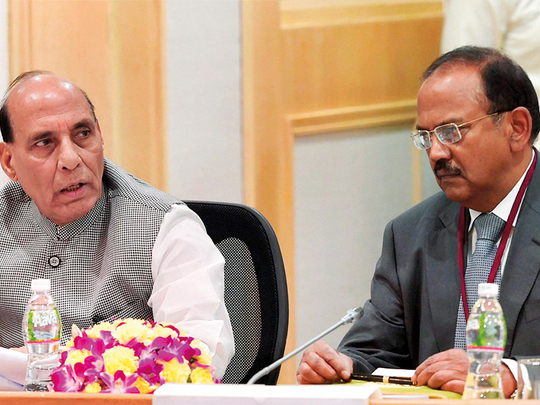
New Delhi India must aggressively step up its offensive against left-wing guerrillas in the face of surging casualties in the security forces, the country’s home minister said.
The government must also push forward with developmental works in the Maoist-hit areas, said Rajnath Singh.
“The solution to the left-wing extremism problem is not possible with any silver bullet,” Singh told chief ministers of Maoist-hit states at a meeting in New Delhi on Monday. “Unity of purpose and unity of action are essential for the success of the security operations.”
Singh called for the choking of financial resources of left-wing extremist groups and said it was the fundamental instrument to counter Maoist violence.
He called for a more proactive approach to deal with left-wing extremism.
“Today we need to consider whether to react only after the occurrence of any incident or we should be more proactive,” he said.
The Home Minister added that the left-wing extremist groups were trying to weaken democracy in the country but would “never succeed” in doing so.
He also called for increased use of technology in security operations and to counter left-wing extremism.
“We need to have enough unmanned aerial vehicles with each battalion. Since extremists use looted weapons, we need to have trackers in the weapons, embed biometrics in triggers and have unique identification numbers in explosive material,” he said.
Highlighting the need for motivation and training, Rajnath Singh said there was a need to improve the training and other facilities at the camps.
“The residential camps of security forces should be well equipped with power and water facility and better connectivity,” he said.
He also called for the need to adhere to the Standard Operating Procedures to ensure safety of the security forces.
“There is a need to chalk out a specific action plan for each threat with short-term, medium-term and long-term strategies clearly defined.”
Rajnath Singh said the whole country was agitated over the “martyrdom” of 25 Central Reserve Police Force (CRPF) personnel in Sukma.
“I am convinced that their martyrdom will not go in vain. The day is not far when this mindless violence will end.”
He stressed on the need to discuss and work out an “integrated strategy” of security by giving impetus to development in 35 worst-affected districts to eliminate the Maoist influence.
He said that “the presence of our forces should instil fear” among the leftist rebels and a sense of confidence among the local people and tribals.
The home ministry convened the meeting to bolster India’s strategy to counter Maoist threats following the deadliest single attack on security forces in seven years in which 25 paramilitary personnel were killed in an ambush in Chhattisgarh last month. The rebels, known in India as Naxalites, regularly clash with police in 10 of India’s 29 states.
Prime Minister Narendra Modi’s government has made some gains against the Maoist rebels, with security forces experiencing fewer causalities in the last three years compared to the previous three years up to 2013. Yet Maoist attacks surged again in 2017, with security forces losing 37 people in March and April alone.
Alongside the human cost, the rebel attacks are a setback to government efforts to open up to investment regions which are rich in iron ore, coal, bauxite and manganese.
Singh said choking the guerrillas’ financial funding should be the most basic strategy to check the influence of Maoists.
“Together with a new strategy and with full force we will counter and achieve victory against left-wing extremism,” he said.
He accepted that the technical intelligence inputs in Bastar Zone of Chhattisgarh were very low in comparison to Telangana and Andhra Pradesh and the reason for this was the only 20 per cent effective connectivity.
“Security forces should have knowledge of language, dialects, traditions and culture, so that they can adapt to the local conditions and earn the trust of the local people which will help in establishing a good intelligence network,” he emphasised.
Rajnath Singh also advocated use of surrendered Maoists to collect intelligence.
He also mentioned that the Centre has deployed 118 battalions of paramilitary forces to assist states in fighting Maoists.
Following the April 24 Sukma attack, the government had vowed to review its anti-Maoist policy. The CRPF has moved its strategic command headquarters for anti-Maoist operations from Kolkata to Chhattisgarh.
The day-long meeting on Monday was also attended by the Secretaries of the union ministries, besides Chief Secretaries and police chiefs, according to an official statement.
“A holistic review of the situation will be undertaken covering a wide canvas of security and development issues, particularly infrastructure building,” he said.
Issues like role of states in assisting paramilitary forces in their operations, raising and employment of India Reserve Battalions and Special India Reserve Battalion were expected to be part of the discussion, the statement said.
It would take stock of capacity building and intelligence issues like vacancies in state police forces, capacity building of state intelligence units and other ministry-wise related matters.
The Naxalites were named after the West Bengal village of Naxalbari, where demands for land reform coalesced into a radical uprising in 1967 inspired by Mao Zedong.
The insurgents say they are fighting for the rights of poor villagers and tribal communities whose resources are, they argue, being exploited to propel India’s $2 trillion (Dh7.3 trillion) economy with few benefits for local people. They have killed more than 12,000 civilians and security personnel in the last two decades.
Police stations, trains and schools have been targets, and the Maoists turned to kidnapping and extortion to fund the rebellion. Rebel groups collect more than Rs1.4 billion (about Dh79.9 million or $21.7 million) annually through extortion, the government said in May 2016, citing a study of the Institute for Defence Studies and Analyses.












